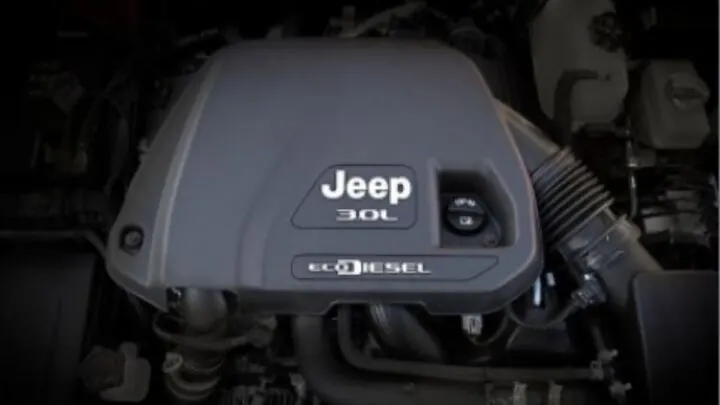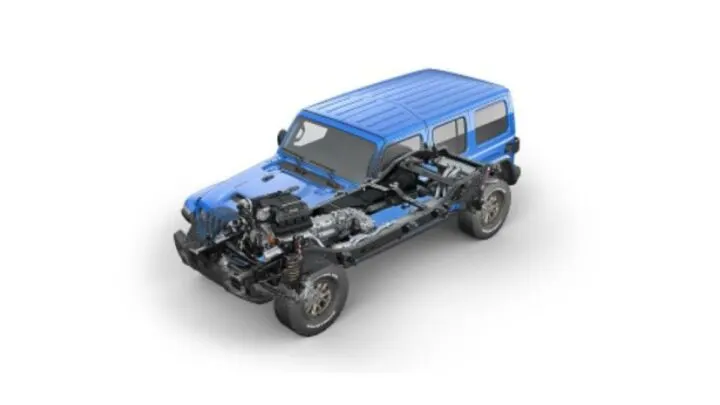The Jeep 4.7 is a 4.7-liter gasoline engine originally made by Chrysler and fitted on several Dodge and Jeep models.
The American Motors Corporation (AMC) developed the engine and debuted it for Chrysler in 1998, becoming their first V8 engine in nearly four decades.
Down the line, the engine debuted in the Jeep family in 2002, with the Jeep Grand Cherokee being the first to use it.
And over the years, it has gotten more efficient and better suited for the Jeeps.
And if you’re planning on buying a Jeep having the 4.7 engine, today’s article is for you.
Here, we’ll take you through its specifications, performance, and common problems you may encounter with the Jeep 4.7 engine.

Jeep 4.7 Engine Specifications
Over the years, there’ve been two different versions of the 4.7-liter engine, with further changes being merely updates since then.
First Generation 4.7 Engine
The first generation engine (the one used on the second-generation Jeep Grand Cherokee) was a 4.7-liter (4,698cc) engine with a 9.0:1 compression ratio.
It had a bore and stroke of 3.66 in x 3.405 in, an iron block, aluminum heads, and two valves per cylinder.
Consequently, it produced 235 horsepower and 295 lb-ft of torque.
The engine was also paired with a four or five-speed transmission or an alternative five-speed manual transmission to suit your preference.
By modern standards, this engine is underpowered, but it was sufficient for the 1999 to 2009 Jeep Grand Cherokee and the 2006 to 2009 Jeep Commander.
The Second Generation 4.7 Engine (High-Output)
The second generation 4.7-liter engine was introduced in 2002, significantly improved over its predecessor, and was dubbed the High-Output or HO engine.
It had a 30 horsepower boost to 265 horsepower and an upgrade to 330 lb-ft of torque.
Unfortunately, it was discontinued in 2008, with the manufacturer opting to continue production of the non-high output 4.7-liter engine.
The engine featured in the 2002 to 2004 and the 2007 to 2008 Jeep Grand Cherokees.
Third Generation Engines (Revisions)
The third generation 4.7-liter engines had significant improvements over their predecessors.
One, they featured new combustion system designs, had two sparks per cylinder, a better intake manifold having shorter runners, and an aggressive camshaft design.
Other modifications included a 9.8:1 compression that improved the power to a higher 310 horsepower and 334 lb-ft of torque.
However, the engine didn’t work well with the Jeeps, and Jeep opted for the 5.7-liter Hemi V8 engine, with 390 horsepower and 407 lb-ft of torque.
Jeep 4.7-Liter Engine Problems
The 4.7-liter engine is a strong and durable engine that can sometimes have reliability and dependability issues.
And as much as its problems stem from a lack of proper care and maintenance, some issues arise due to the engine’s inadequacies.
If you’re planning on purchasing a Jeep with this engine, here are some problems you need to know.

Head Gasket Problems
Blown head gaskets are critical engine faults that instigate further problems commonly affecting the Jeep 4.7 engine.
The role of the head gaskets is to provide a leak-free seal between the engine head and the block.
Consequently, any fault or crack that appears on the head gasket causes the engine to lose compression.
The result is that the engine runs roughly while idling, or it may even knock or stall while you’re on the road.
However, rough idling, knocking, or stalling may result from other engine problems; hence it’s best to take your Jeep for repairs as soon as possible.
Here are some signs of a faulty head gasket.
Engine Overheating
Your engine overheating is the most common and reliable sign that your Jeep has a faulty head gasket.
A failed head gasket results in a loss of compression; hence the engine overworks to deliver the usual torque and horsepower.
Moreover, a blown head gasket creates gaps through which the coolant leaks. In the end, your vehicle’s engine has insufficient coolant resulting in more cases of overheating.
White Smoke from the Exhaust
A small amount of white smoke from your Jeep’s exhaust shouldn’t worry you.
However, be keen to note any increase in exhaust gases as this is a clear sign of underlying engine problems such as a leaking head gasket.
And usually, the engine coolant is a mix of water and ethylene glycol or propylene glycol (antifreeze).
When this mixture is burned in the engine, water vapour escapes with exhaust gases resulting in white smoke.
Low Coolant Levels
If your Jeep 4.7-liter engine’s coolant levels are low yet there aren’t any engine leaks, chances are high that its head gaskets are blown.
This is especially the case when the gasket between the coolant channel and the combustion chambers fails, causing the engine to consume the coolant.
Contaminated or Milky Oil
From general science, we know that water and oil don’t mix under normal conditions.
If your engine’s head gasket is broken and oil gets to mix with the coolant, the resulting mixture is very ineffective and a danger to your engine.
First, the oil loses its lubricating properties and second, the mixture can lock up your engine.
Head gaskets are cheap and may cost anywhere between $300 and $350.
However, labor costs are pretty high, and you’ll have to part with anywhere between $1,200 and $1,500 for 6 to 10 hours of labor.
Additionally, don’t replace it on your own if you lack extensive mechanical knowledge.
Engine faults are very serious and should be addressed with utmost urgency as they may lead to further breakdowns.
Other Reasons the 4.7 Engine May Have Problems
There are a few other reasons why the Jeep 4.7 engine could be acting up.
Faulty Cooling Systems
The Jeep cooling system comprises the radiator, water pump, hoses, thermostat, cooling fan, and other smaller components.
A fault in any of the components may cause the cooling system to overheat and result in metal fatigue or engine failure.
Consequently, every Jeep Grand Cherokee driver should be able to diagnose these problems before they get out of hand.
Water Pump Failure
A water pump directs water through cooling channels to prevent the engine from overheating. If it fails, your engine will quickly overheat and ultimately break down or stall your vehicle.
Leaky Radiator Hoses
Radiator hoses circulate the coolant taking away heat from the engine and dissipating it to the environment.
If one is leaking, the coolant pressure decreases, lowering the effective heat dissipation rate of the cooling system.
The result is that the engine overheats even when it shouldn’t.
Thermostat Failure
The thermostat regulates engine temperature and controls the level of coolant allowed through your Jeep’s radiator.
It may fail to release a sufficient amount of coolant through the engine when faulty.
Replacing a thermostat is cheap and costs around $300, including labor. If it’s the radiator, replacing it costs close to $700, including labor costs.
Leaking Valve Cover Gasket
A leaking valve cover gasket is a common issue with a high-mileage Jeep 4.7 engine.
Generally, valve cover gaskets will naturally harden and crack as they age; hence this is an issue that affects all engines that have them.
Common signs of leaks include smoke, oil leaks, and a burning oil smell when the engine is running.
Valve cover gaskets are generally cheap and cost around $130 and $200 for a set of two.
However, replacing them is labor intensive, and you may have to pay $400 to $600 to have one replaced.
Failed Valve Seat
The engine valve lets fuel and air into and out of the engine’s cylinder before and after each combustion cycle.
The valve seat’s role is to keep the valve shut when closed and cause a loss of engine compression when they’re not fully shut.
The result is that your Jeep will suffer from an undesirable loss of compression, poor performance, and fuel economy issues.
On the brighter side, this issue isn’t very common and mostly affects the older first-generation 4.7-liter Jeep engines.
Replacing Jeep 4.7-liter engine valve sets is complicated since they’re attached to the cylinder head.
Consequently, an engine head rebuild is necessary, or you can opt to purchase a new cylinder head to eliminate the problem.
Therefore, you’ll pay close to $1,000 to get rid of this problem.

The Takeaway on the Jeep 4.7 Engine
The Jeep 4.7-liter engine may have been revolutionary in its prime, but it can’t match the power and torque delivered by present-day engines.
It also has its fair share of problems, as we’ve seen, making it a fairly unreliable engine.
However, it’s still a good engine with respectable fuel economy and decent power delivery.
